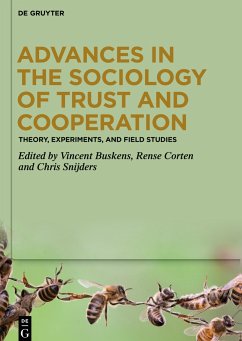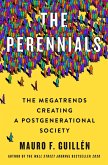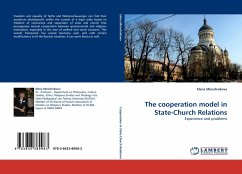The problem of cooperation is one of the core issues in sociology and social science more in general. The key question is how humans, groups, organizations, institutions, and countries can avoid or overcome the collective good dilemmas that could lead to a Hobbesian "war of all against all".
The chapters in this book provide state of the art examples of research on this crucial topic. These include theoretical, laboratory, and field studies on trust and cooperation, thereby approaching the issue in three complementary and synergetic ways. The theoretical work covers articles on trust and control, reputation formation, and paradigmatic articles on the benefits and caveats of abstracting reality into models. The laboratory studies test the implications of different models of trust and reputation, such as the effects of social and institutional embeddedness and the potentially emerging inequalities this may cause. The field studies test these implications in applied settings such as business purchasing and supply, informal care, and different kinds of collaboration networks.
This book is exemplary for rigorous social science. The focus is on effects of social conditions, in particular different forms of social and institutional embeddedness, on social outcomes at the macro level. Modelling efforts are applied to connect social conditions to social outcomes through micro-level behavior in ways that are easily overlooked when argumentation is intuitive and impressionistic. The book sets forth a mixed-method approach by applying different empirical methods to test hypotheses about similar questions. Several contributions re-evaluate the theoretical strengths and weaknesses following from the laboratory and field studies. Improving the theory in light of these findings facilitates pushing the boundaries of social science .
Hinweis: Dieser Artikel kann nur an eine deutsche Lieferadresse ausgeliefert werden.
The chapters in this book provide state of the art examples of research on this crucial topic. These include theoretical, laboratory, and field studies on trust and cooperation, thereby approaching the issue in three complementary and synergetic ways. The theoretical work covers articles on trust and control, reputation formation, and paradigmatic articles on the benefits and caveats of abstracting reality into models. The laboratory studies test the implications of different models of trust and reputation, such as the effects of social and institutional embeddedness and the potentially emerging inequalities this may cause. The field studies test these implications in applied settings such as business purchasing and supply, informal care, and different kinds of collaboration networks.
This book is exemplary for rigorous social science. The focus is on effects of social conditions, in particular different forms of social and institutional embeddedness, on social outcomes at the macro level. Modelling efforts are applied to connect social conditions to social outcomes through micro-level behavior in ways that are easily overlooked when argumentation is intuitive and impressionistic. The book sets forth a mixed-method approach by applying different empirical methods to test hypotheses about similar questions. Several contributions re-evaluate the theoretical strengths and weaknesses following from the laboratory and field studies. Improving the theory in light of these findings facilitates pushing the boundaries of social science .
Hinweis: Dieser Artikel kann nur an eine deutsche Lieferadresse ausgeliefert werden.








